How a former Kiwi PM, motherhood and friends inspired an investment fintech
Many believe mixing business and friendship is a recipe for disaster but for the three creators of Sharesies their bond has led to an app used to invest over $3bn across Australia, New Zealand and America.
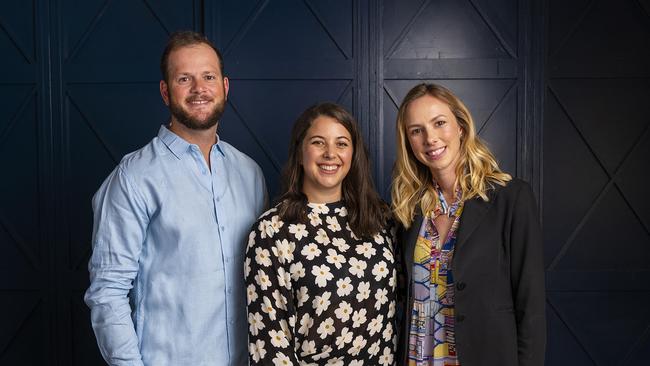
Brooke and Leighton Roberts were married in Wellington on March 24, 2017.
It was just a fortnight after the born-and-bred New Zealanders started a fintech business called Sharesies with friend Sonya Williams and three other co-founders.
Their vision for the company was to build a wealth development platform focused on financial empowerment, designed to make investing more accessible for more people.
They wanted to give someone with $5 the same financial opportunities as a person with $5m by offering education, access and motivation to remove the barriers to investing.
Before taking the leap into the start-up world, Leighton had led the home-loan and business lending portfolios at Kiwibank. He’d also experienced the benefits of investing regularly, as he was part of an investment club since the age of 17.
In April 2017, just as he and Brooke started the taxing process of conducting their maiden capital raising to support the new Sharesies business, they discovered she was pregnant.
“I was pretty concerned at the time, to be honest,” she now says.
“When you googled anything online then, you saw that female entrepreneurs had more trouble raising money than men.”
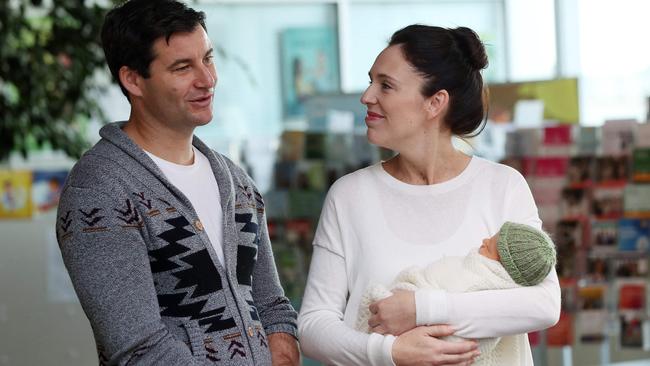
Months later and 39 weeks’ pregnant, she heard news on her car radio that inspired her.
“There was breaking news that then prime minister Jacinda Ardern was pregnant. I was like, ‘Well, if she can do it running a country, I’m going to be fine running a start-up’.
“Honestly, I think it kind of changed a lot of the thinking at the time too (towards funding female founders).”
Today the Sharesies app is used by more than 690,000 investors who have collectively invested over $3bn across the Australian, New Zealand and American markets.
But what is most intriguing about the company is that Brooke, Leighton and Sonya work in a co-leadership “3EO” model that emerged organically. It is an unconventional, yet successful leadership structure.
What also unites them is that they all have young children.
Brooke and Leighton’s are now six and four, while Sonya has a young daughter. Her husband, who is now a stay-at-home dad, also formerly worked for Sharesies.
They all firmly believe that being both good friends and parents has made them better business leaders.
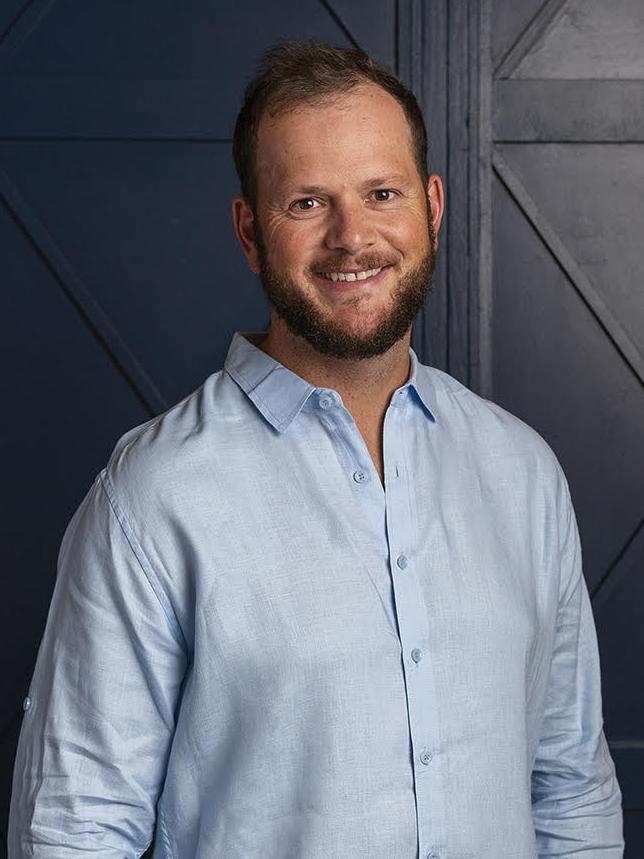
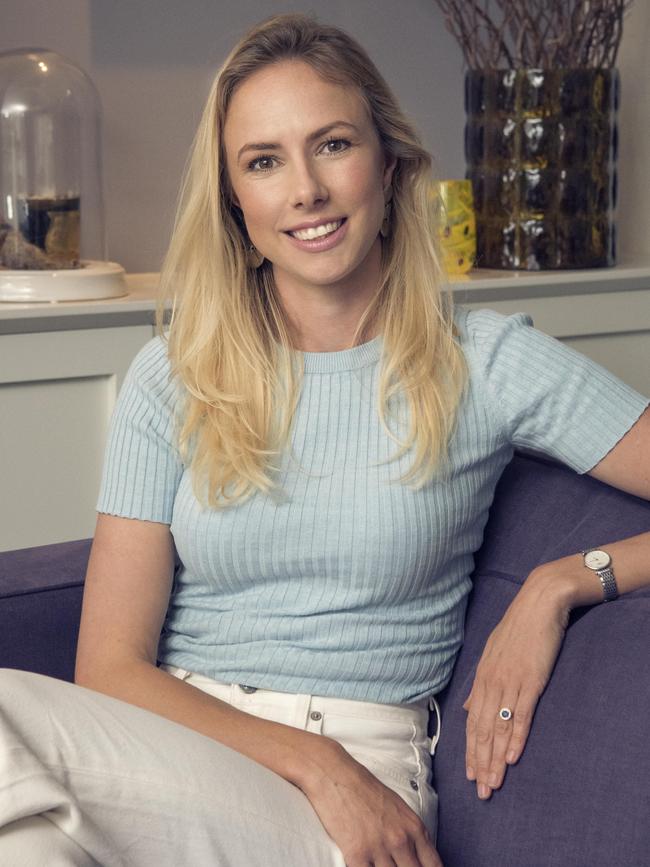
“I had a hard path to becoming a mum, as I think lots of people do. I think I grew a lot from that as a leader,” says Sonya, who worked at a law firm, a call centre and a debt collection agency before building a career in technology and global marketing, and product management at Xero and Kiwibank.
“Going through that experience has taught me a lot, but it also creates that space for people in our business that are going through that as well. And its taught me patience.
“Sometimes you might not be able to get through it all today. You might have these ideas of what you want to get done but the day just might not go like that.
“So I’ve learned to be a bit more accepting of that and realised that some things just do get solved by time.”
Brooke says she and her partners deliberately built a company with flexibility that empowers its staff to be high performing both at work and in their personal lives.
“We look at everybody as humans with other things going on in their lives outside work,” she says.
“I think we’ve created really cool ways of working, where people can be the best at work and be their best outside of work.”
Fruits of their labour
The Sharesies logo – a simple pink-coloured pineapple – is based on what Sonya calls the fruit’s “democratisation journey”.
In 17th and 18th century Europe, the pineapple was a status symbol of wealth, flaunted by the few who could afford such extravagance. It was known as the crown jewel of the fruit world.
But it eventually fell into the hands of the masses and she says that told a new story of democracy.
“When you think of where pineapples are at today, we buy them in a can, we can eat them on pizza if that suits your taste,” Sonya says.
“So if you think about our journey, investing in shares was seen as something that was only for people who had a certain amount of wealth. We wanted to make it part of everyone’s day to day.”
In 2018 Wellington-based Sharesies secured its maiden $NZ4m capital injection from New Zealand classifieds group Trade Me to help fund new product development.
In December 2020 the firm raised a further $NZ25m from new and existing investors, including K1W1 – the investment company of Stephen Tindall, the founder of New Zealand retailer The Warehouse Group – and New Zealand venture capital firm Icehouse Ventures. That raising supported Sharesies’ launch in Australia, which took place in April 2021.
It also introduced Amplo, a US-based global venture capital firm which has a stated mission to support entrepreneurs building globally ambitious companies that matter, to the share register.

The Texas-based Amplo has two ex-prime ministers on its advisory board: New Zealand’s Sir John Key and Australia’s Julia Gillard.
In October 2021, Sharesies raised a further $NZ50m through a series C round that valued the company at $NZ500m.
It was supported by Indian businessman Rahul Mehta, managing partner at New York investment firm DST Global who is known for his early investments in Facebook, Spotify Twitter and, more recently, online food delivery giant DoorDash and investment app Robinhood.
Brooke says Sharesies chose to partner with venture capital firms, as opposed the private equity, because of their penchant to focus on growth.
“Venture capitalists typically invest for growth and they like the growth path ahead of us. Our venture capitalist investors also understand and work with fintechs globally. So it is really helpful to have that insight that we can bring into our world,” she says.
“But ultimately every shareholder has joined us because they really care about our purpose and why we exist, and want to see this change we are driving in the investment world happen.”
She says Sharesies has a strong cash position and that a majority of the funds raised in recent years were still on the balance sheet.
A sharemarket listing is an option, but nothing is imminent.
“We’ve got heaps of momentum at the moment. This is a strong business so we are doubling down on growth,” she says.
“We will always assess the best capital opportunities to deliver the return we need. But at the moment we are just really focused on building the best purpose-driven company we can. We will assess opportunities like that when they come up.”
One global growth opportunity for Sharesies has been its move into managing employee share ownership plans (ESOP), arrangements designed to grant employees equity ownership in the company they work for.
ESOP product, Staff Shares, is now used by 20 per cent of NZX-listed companies.
In April this year Sharesies started hosting the online trading of New Zealand dairy behemoth Fonterra’s co-operative shares among suppliers.
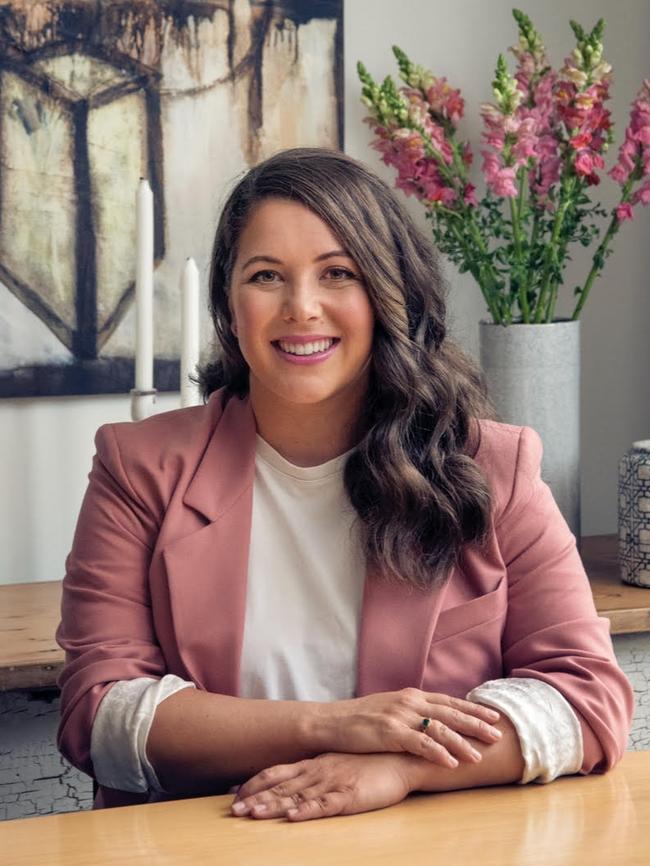
Trading in the shares, which are tied to milk production, had previously been through a closed market on the NZX. Now co-op members can trade their shares on the Sharesies mobile app and browser, and receive alerts on changing prices.
In April Sharesies secured an Australian financial services licence and made its first acquisition – that of Auckland equity management platform Orchestra, which offers ESOP and share registry solutions to more than 500 private companies and 60,000 shareholders in the region.
Its clientele in Australia includes names such as Les Mills, JBS&G, Fyfe, Konvoy, Willow, LEAP Legal, and Spriggy.
“We’d like more companies to give shares to their staff and when that happens, we want the companies to be getting the benefits of that. So that the people who are getting the shares appreciate it, they value it, and they understand it. That’s our job,” Leighton says.
“Loads of people we speak to had their first investment opportunity through the company they worked for.
“So there is a great education piece around that, understanding about it also being a great wealth builder for people. We are doing a lot more like this in the company partnership space, on the B2B side, which are more likely to be global plays for us.”
Observing where the winds are blowing
Questions have often been asked about consumer protection safeguards on the Sharesies platform. Notably can investors afford their losses if things go bad, especially if they are inexperienced?
But Leighton stresses that many users of the platform invest only in three or four exchange traded funds and a similar number of stocks.
Many also dollar-cost-average into the funds, meaning they invest a fixed dollar amount regularly, regardless of the unit or share price.
“I can’t actually remember a customer complaint where they have said ‘You lost my money’,” he says.
“We make it clear to users that you are making a decision to invest and people own that.”
Because Sharesies is aimed at retail investors, it does not cater for more sophisticated day traders who are looking to buy products such as CFDs.
Sharesies offers two fee structures: a pay-as-you-go option and monthly plans.
Under the former, there is a 1.9 per cent transaction fee charged on the amount invested (or sold), up to a fee cap of US$5 for US shares, $6 for Australian shares and $NZ25 for New Zealand stocks.
The fees have been criticised on some online forums but Sharesies must be competitive with rival online investor platforms such as Raiz, Superhero and Spaceship Voyager.
Given the strong growth of the business, one piece of advice Leighton would give to other entrepreneurs – in fintech or otherwise – is to look “where the winds are blowing”.
“Observing where the winds are blowing in your life or your business is critical. If you’re trying to put energy into a headwind, then it’s just not worth it from a business perspective,” he says.
“Like it might be from a purpose perspective or something else. But from a business perspective, it is not so.
“So I always think now, ‘Is this actually worth doing, given how hard it is going to be?’ I think we’ve been guilty during some of our hardest times of trying to do business into a headwind.”
His wife’s advice to budding entrepreneurs is to feel a deep connection and passion for what you do.
“At Sharesies it really feels like we are using our skills to do the best work that we can do,” Brooke says.
Most importantly she, her husband and their good friend believe the company’s co-leadership “3EO” model has pioneered a way of working, disproving the old adage to never mix friendship, family and business.
“One thing we are really passionate about exploring is how we can have our roles leading a successful company globally, be great parents and be part of our communities as fully rounded humans,” Sonya says.
“I don’t think that is the known template of leadership. But I think there’s enough of it happening now that there is a new template for the future.”




To join the conversation, please log in. Don't have an account? Register
Join the conversation, you are commenting as Logout